Instant Pot Applesauce (+ Slow cooker)
This healthy homemade applesauce recipe can be made right in your Instant Pot (or slow cooker). It’s so easy and incredibly delicious that you’ll want to make it again and again!
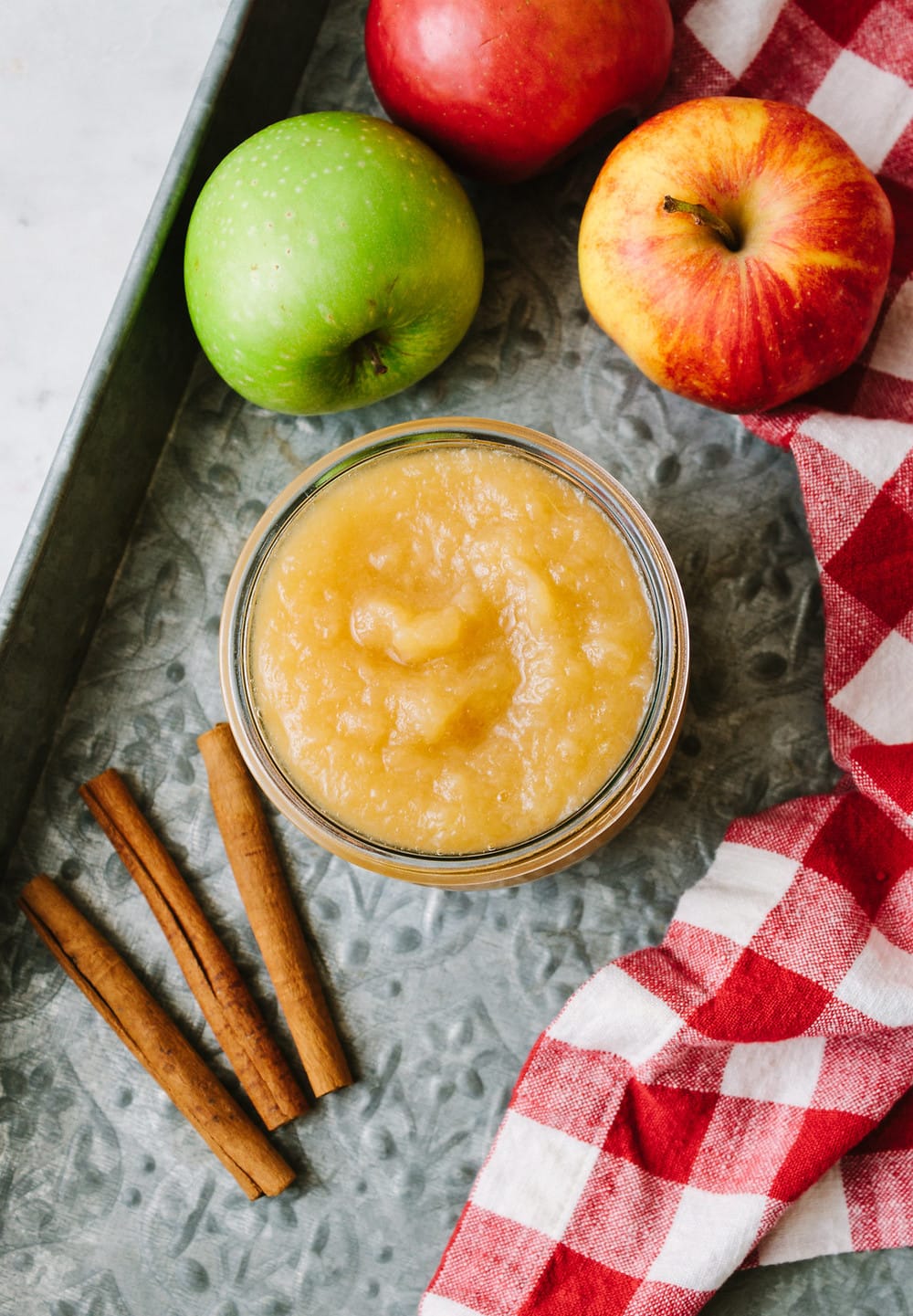
Why We Love This Recipe!
I love the simplicity and versatility of this minimal-ingredient applesauce. There are no extra additives like sugar, and you know exactly what’s in your applesauce. All you need are apples, a little lemon juice, and water, plus a stick of cinnamon if you like!
A few key notes about this instant pot & slow cooker applesauce recipe:
- It’s sugar-free (unsweetened).
- It can be made chunky or smooth.
- Can cook with the skins (no peel) or without the skins.
- Instant Pot method is ready in 20 minutes.
- Slow cooker method is ready in 3- 4 hours.
Without a doubt, homemade applesauce made right in your kitchen with no additives is easy and the best ever!
Your kids will love it, you will love it, and it will be a win-win for everyone!
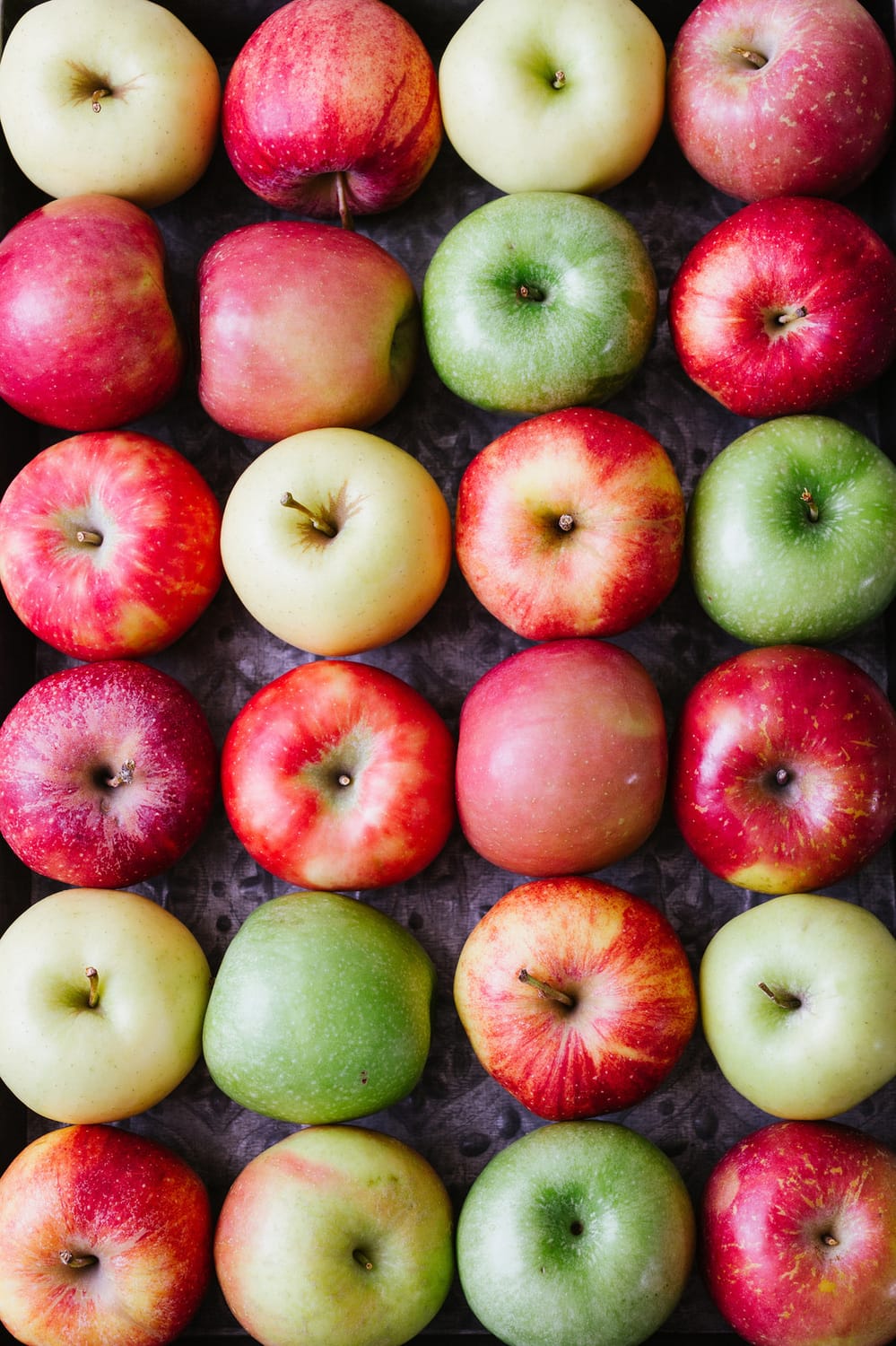
The Best Apples For Homemade Applesauce
Apples, apples, and more apples. There are many types to choose from!
- When picking your apples stick with your favorites to start, using all of one type or a combination of 2 – 3 types of apples. Organic is best, especially if cooking with the skins on!
- I used all Fuji apples, which were delicious but on the sweeter side. So, if you prefer your applesauce to be very sweet, use only Fuji apples.
- As for combinations, my favorites are a mix of Fuji and Granny Smith apples or a mix of honey crisp, Granny Smith, and Fuji. These combos balance each other out well, having just the right amount of natural sweetness and tartness.
To peel or not to peel your apples?
- Peeling: It takes a bit longer to prep, but the end result is a little easier since you’ll simply need to mash the apples with a potato masher, the back of a fork, or a slotted spoon.
- No Peel: The prep time moves along quicker, but you will need to use an immersion blender or transfer the cooked apples to a blender or food processor to get a smooth consistency. The clear advantage of not peeling your apples is the health benefits, apples skins have antioxidants and fiber.
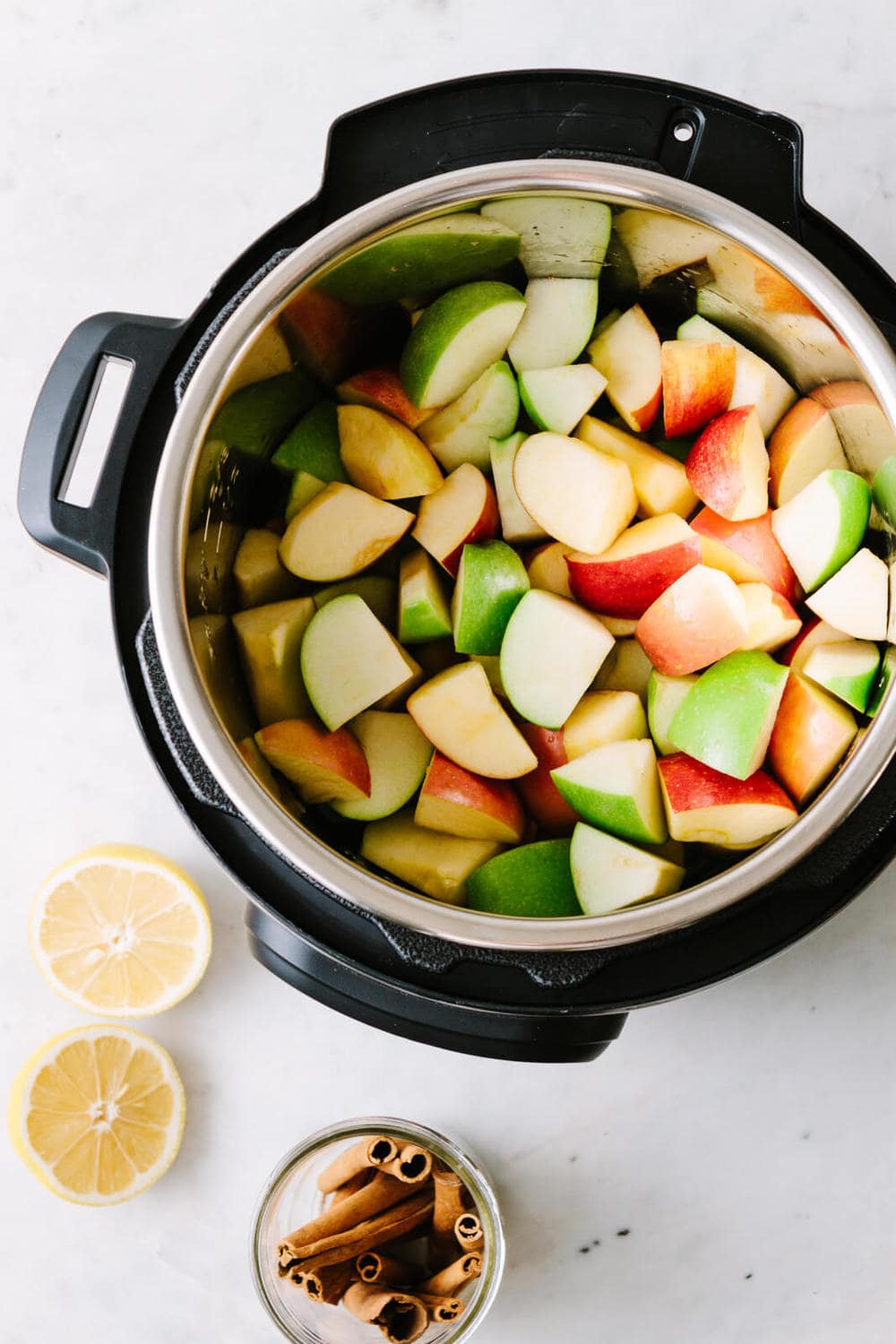
HOW TO MAKE INSTANT POT APPLESAUCE
- Whether peeling the apples or not, slice and core the apples. The apples shown above were quartered, cored, and quartered again – easy peasy!
- Place the quartered apples, lemon juice, and water in the insert of a 6 qt. Instant pot. Cook on high pressure for 6 minutes and let vent naturally for 6 minutes or so.
- Once done, you’re ready to mash or puree the applesauce (shown below):
Whether you make applesauce with the skins or without will depend on how you mash them.
- If cooking with the skins on, use an immersion blender to puree the mixture, a blender also works.
- When cooking without the skins, you can simply mash with a potato masher or the back of a fork or slotted spoon.
- For ultra-smooth applesauce, use a blender to puree.
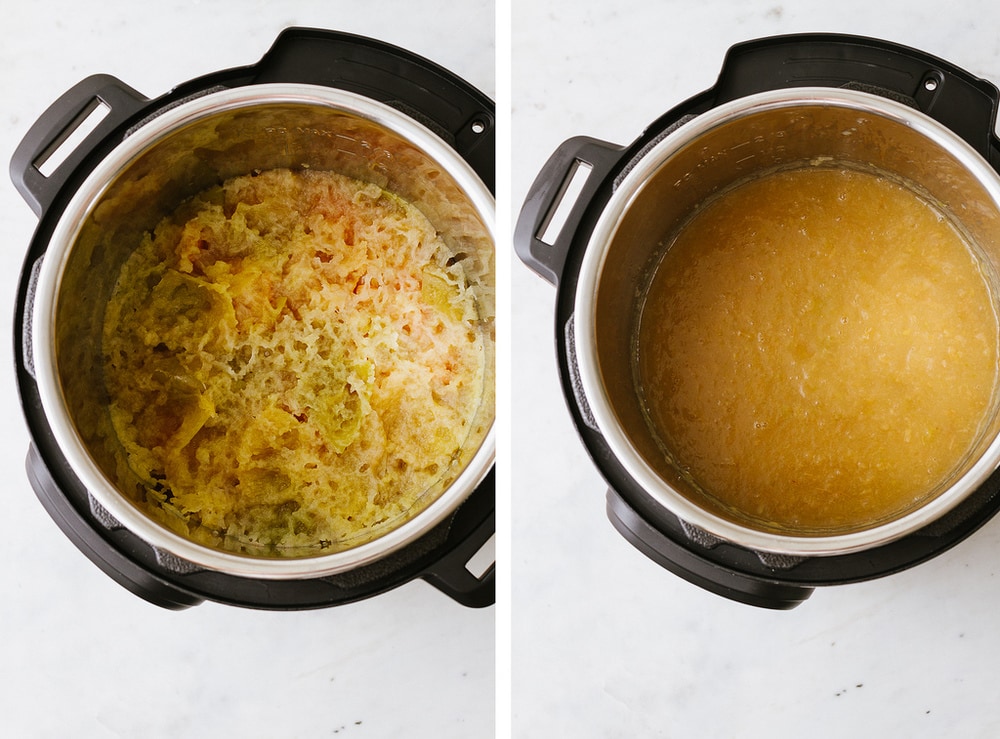
What If I Don’t Have An Instant Pot?
You can use this easy slow cooker method:
- Add the apples to the bottom of the crockpot, and add the lemon, water, and optional cinnamon.
- Set the slow cooker on high for 4 hours, stirring once or twice.
- Once done: If using unpeeled apples, mash with a potato masher or the back of a fork; and with skins, use an immersion blender or pout into a standing blender to puree.
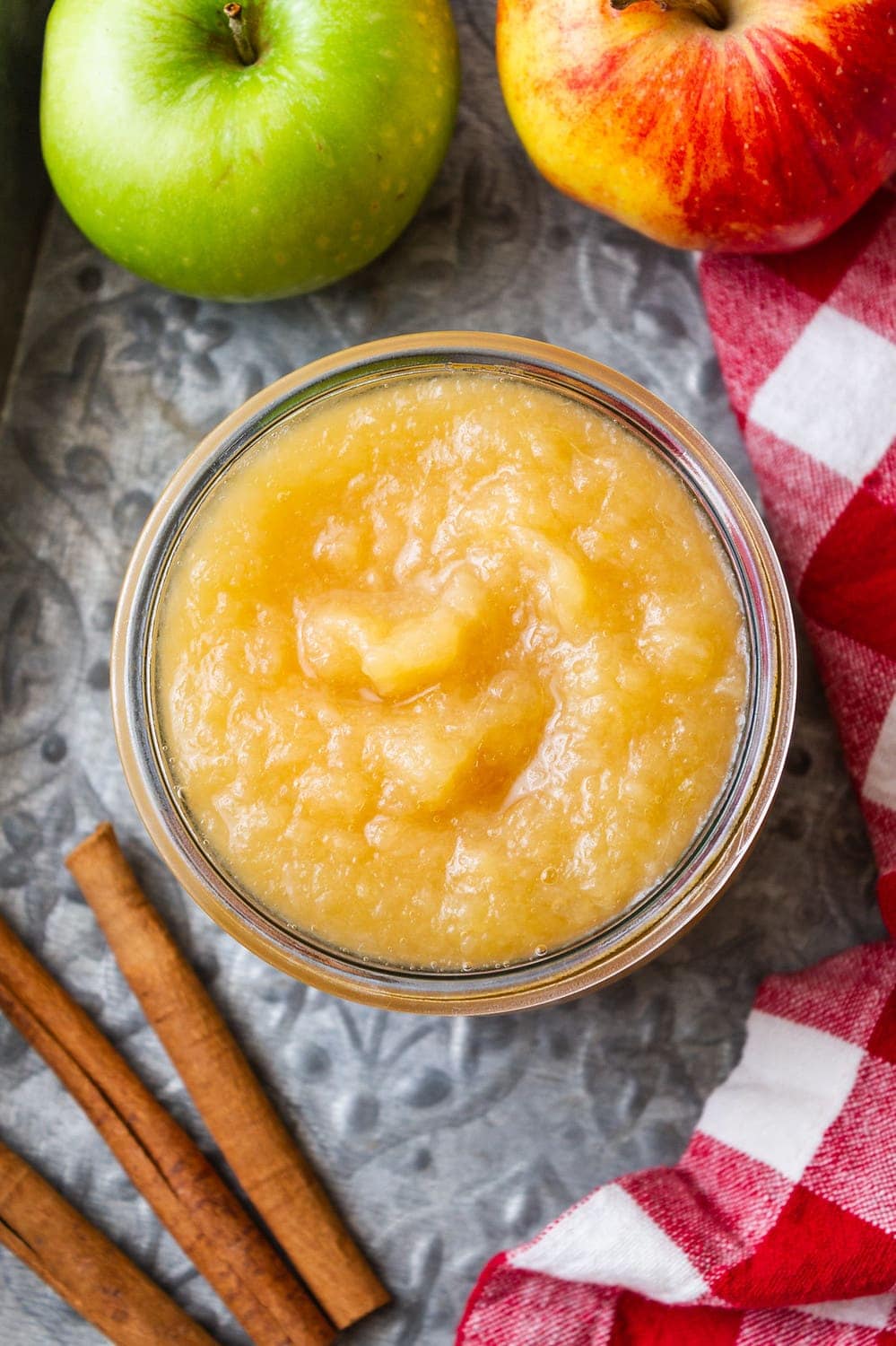
How To Use Applesauce
Use your freshly made applesauce in these fluffy Cinnamon Applesauce Pancakes, 4-ingredient Chunky Apple-Cinnamon Oatmeal Breakfast Cookies, Cranberry Orange Bread, and this super easy, oil-free Applesauce Bread. For a variation on applesauce, try using this Cranberry Applesauce for even more flavor, and perfect for the winter holiday table!
More reasons to love applesauce, it makes a terrific egg and oil substitute when baking. In most baking recipes, you can use 1/4 cup of unsweetened applesauce in place of one egg called for, making it easy to veganize most baked goods. Some recommend mixing it with 1/2 teaspoon of baking powder. If you only have sweetened applesauce on hand, then reduce the amount of sugar in the recipe. Applesauce is also a healthy replacement for oil in many baked goods and can be substituted in a 1 to 1 ratio.
Can Applesauce be Frozen?
Yep, you can store your homemade applesauce in the refrigerator for up to 1 week or freeze for up to 2 months stored in an airtight container and leave at least 1/2 inch headspace at the top, as applesauce will expand when frozen.
More Instant Pot Recipes!
- Instant Pot Mashed Potatoes
- Cranberry Applesauce (Instant Pot + Stovetop)
- Healthy Baked Beans – Instant Pot
- Cuban Black Bean + Mango Bowl – Instant Pot
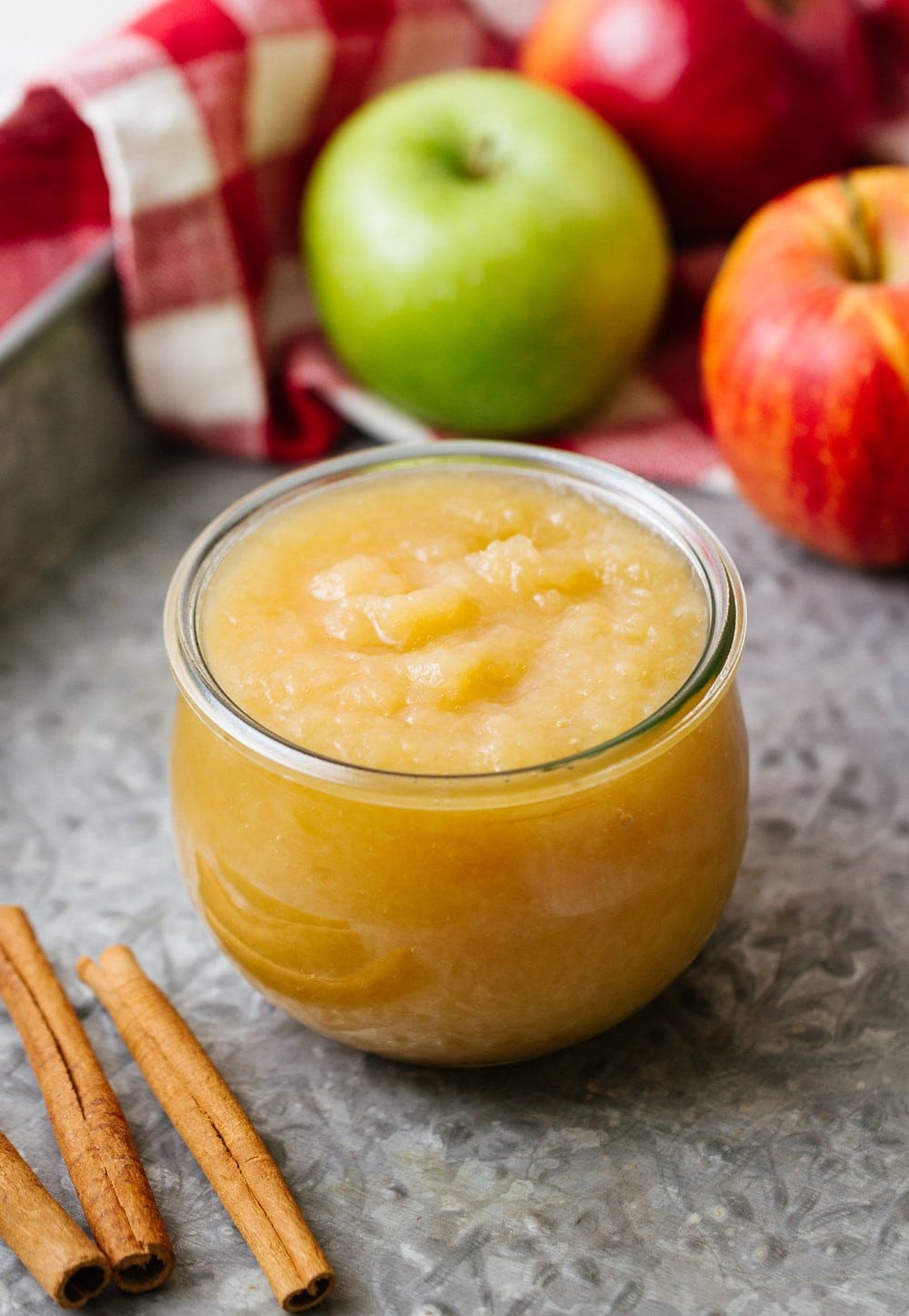
If you try this easy applesauce recipe, please let me know! Leave a comment and rate it below. I love to hear what you think, or any changes you make.
PrintINSTANT POT APPLESAUCE (+ SLOW COOKER)
Healthy, homemade applesauce recipe made right in your Instant Pot (or slow cooker). Forget store bought, it’s so easy and incredibly delicious when made at home without sugar & additives, you’ll want to make it again and again!
- Prep Time: 5 min
- Cook Time: 15 min
- Total Time: 20 minutes
- Yield: Makes 4 – 4 1/2 cups 1x
- Category: Side, Snack
- Method: Instant Pot, Slow Cooker
- Cuisine: Vegan
Ingredients
- 3 lbs. apples, about 6 – 7 (fuji, gala, granny smith, honey crisp, delicious)
- 1 small lemon, juice of
- 1/2 cup water
- 1 cinnamon stick or 1/2 – 1 teaspoon cinnamon, optional
Instructions
Prepare the apples:
- Unpeeled: Wash the apples well, quarter and core the apples, cut the quarters in half.
- Peeled: Peel the apples, quarter, core and cut the quarters in half.
INSTANT POT:
- Place apples in the bottom of the Instant pot, add the lemon juice, water and optional cinnamon.
- Attach lid, and make sure vent is in the SEALED position. Push the PRESSURE COOKER button, and manually set the time for 6 minutes.
- When done, let the steam vent on its own, takes about 6 minutes. Move the vent to open, careful not to burn yourself as there may still be steam left. Remove lid and let cool a bit, remove cinnamon stick.
- Mash or puree: If cooking with the skins on, use an immersion blender right in the pot to puree the mixture, or transfer to a blender or food processor to puree until desired consistency. When cooking without the skins, you can simply mash with a potato masher or back of a fork or slotted spoon.
SLOW COOKER:
- Add the apples to the bottom of the crockpot, add the lemon, water and optional cinnamon, and cover with lid.
- Set the slow cooker on high for 4 hours, stirring once or twice. Let cool a few minutes, remove cinnamon stick, and mash or puree.
- Mash or puree: If cooking with the skins on, use an immersion blender right in the pot to puree the mixture, or transfer to a blender or food processor to puree until desired consistency. When cooking without the skins, you can simply mash with a potato masher or back of a fork or slotted spoon.
Store your applesauce in the refrigerator for up to 7 days, or freeze for up to 2 months.
Makes 4 – 4 1/2 cups
Notes
For ultra-smooth applesauce, use a blender to puree.
If you prefer more sweetness, add a tad of sugar 1 – 2 teaspoons at a time until desired sweetness.
If you didn’t add cinnamon while cooking, feel free to add some after cooking.
Picking apples:
When picking your apples stick with your favorites to start, using all of one type or a combination of 2 – 3 types of apples. Organic is best, especially if cooking with the skins on!
I used all Fuji apples, which were delicious but on the sweeter side. So, if you prefer your applesauce to be very sweet, use only Fuji apples.
As for combinations, my favorites are a mix of fuji and granny smith apples or a mix of honey crisp, granny smith, and fuji. These combos balance each other out well, having just the right amount of natural sweetness and tartness.
To peel or not to peel your apples?
- Peeling: It takes a bit longer to prep, but the end result is a little easier since you’ll simply need to mash the apples with a potato masher, the back of a fork, or back of a slotted spoon.
- No Peel: The prep time moves along quicker, but the end time may take a little longer because you will need to use an immersion blender or transfer the cooked apples to a blender or food processor, to get a smooth consistency. The clear advantage of not peeling your apples is the health benefits, apples skins have antioxidants and fiber.
FOLLOW TSV on Facebook, Instagram, Pinterest, Youtube, Subscribe (email), or RSS for more recipes and inspiration!

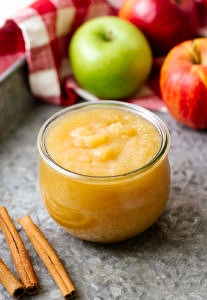
I used all Mutsu apples. The applesauce froze great. The best ever
This is the first time I tried this recipe and it made delicious Apple Sauce.
It is so simple and straight forward.
It has now become my “go to” apple sauce recipe.
Thank you!
Great recipe. Simple and turns out wonderful.
Is there any alternative to the lemon juice that could be used, due to citrus sensitivity?
You can omit the lemon juice or use a little apple cider vinegar or unsweetened apple juice. I hope that helps. Enjoy!
Can I mix Bramley apples (cooking) with regular apples like Jazz? :)
Yes, you can use your favorite mix of apples or what you have on hand. Enjoy the applesauce!
I’ve made this recipe a few times and it turns out perfect each time!
This was fast and easy in the instant pot, even with the skin on. The perfect fall treat with a bit of cinnamon and sugar! I just went to make it again, and noticed if you use the 2x, 3x function in the recipe that the number of pounds of apples changes, but the suggested number of apples doesn’t! I can do the math, but thought I’d mention it in case anyone was making it for the first time and didn’t notice.
Try Jonagold apples…they make a naturally sweet applesauce. Thank you for this recipe. I usually make it on the stove and was not sure how long to cook in the instant pot.
Why on earth do you want to cook the apples for such a long time? You need not cook them at all. Yopu could greate them and add fresh lemon juice, another variation is adding cinnamon, another variation is adding a mashed banana, and the apple sauce tastes great WTIHOUT any cooking.
Cooking destroys so many nutrients, especially with the slow cooking of several hours.
If you want to cook them by all means, put them in a blender, then put them into the cooking pot, preferable steam pressure, bring to a boil and remove from the heat, and that’s it.
By the way, adding some lemon zest to boil with or simple the peeling of an organic lemon before cooking makes the sauce very delicious and fruity.
That sounds so good! Thanks for the inspiration. I may have to add raw applesauce to the recipe collection. Yum!!
Better if you don’t peel – all the antioxidants are in the skin.
Yes, so true, and more fiber too!